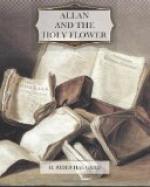What I did not inform him was that we had set the flag there to be a sign and a beacon to us in case we should ever be forced to find our way back to this place unguided and in a hurry. As a matter of fact, this piece of forethought, which oddly enough originated with the most reckless of our party, Stephen, proved our salvation, as I shall tell later on. At the foot of the mound we set our camp for the night, the Mazitu soldiers under Babemba, who did not mind mosquitoes, making theirs nearer to the lake, just opposite to where a wide hippopotamus lane pierced the reeds, leaving a little canal of clear water.
I asked Komba when and how we were to cross the lake. He said that we must start at dawn on the following morning when, at this time of the year, the wind generally blew off shore, and that if the weather were favourable, we should reach the Pongo town of Rica by nightfall. As to how we were to do this, he would show me if I cared to follow him. I nodded, and he led me four or five hundred yards along the edge of the reeds in a southerly direction.
As we went, two things happened. The first of these was that a very large, black rhinoceros, which was sleeping in some bushes, suddenly got our wind and, after the fashion of these beasts, charged down on us from about fifty yards away. Now I was carrying a heavy, single-barrelled rifle, for as yet we and our weapons were not parted. On came the rhinoceros, and Komba, small blame to him for he only had a spear, started to run. I cocked the rifle and waited my chance.
When it was not more than fifteen paces away the rhinoceros threw up its head, at which, of course, it was useless to fire because of the horn, and I let drive at the throat. The bullet hit it fair, and I suppose penetrated to the heart. At any rate, it rolled over and over like a shot rabbit, and with a single stretch of its limbs, expired almost at my feet.
Komba was much impressed. He returned; he stared at the dead rhinoceros and at the hole in its throat; he stared at me; he stared at the still smoking rifle.
“The great beast of the plains killed with a noise!” he muttered. “Killed in an instant by this little monkey of a white man” (I thanked him for that and made a note of it) “and his magic. Oh! the Motombo was wise when he commanded——” and with an effort he stopped.
“Well, friend, what is the matter?” I asked. “You see there was no need for you to run. If you had stepped behind me you would have been as safe as you are now—after running.”
“It is so, lord Macumazana, but the thing is strange to me. Forgive me if I do not understand.”
“Oh! I forgive you, my lord Kalubi—that is—to be. It is clear that you have a good deal to learn in Pongo-land.”
“Yes, my lord Macumazana, and so perhaps have you,” he replied dryly, having by this time recovered his nerve and sarcastic powers.
Then after telling Mavovo, who appeared mysteriously at the sound of the shot—I think he was stalking us in case of accidents—to fetch men to cut up the rhinoceros, Komba and I proceeded on our walk.




